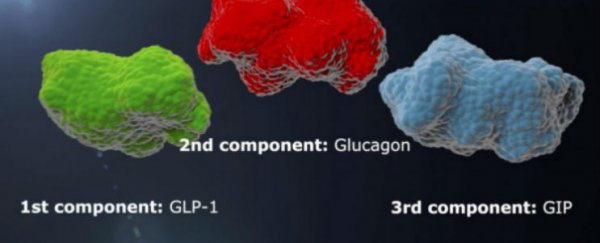Researchers in Germany have developed a new drug that combines the actions of three gastrointestinal hormones to improve glucose sensitivity and calorie burning, while reducing appetite. And in pre- clinical trials with mice, it reduced their body weight by 30 percent.
The development of the drug was based on previous work showing that chemical compounds called peptides that have been engineered to influence the activity of gastrointestinal hormones can effectively treat adult-onset diabetes. Named GLP-1 and GIP, these two hormones are released by the body after you eat, so blood sugar levels can remain stable. GLP-1 is also responsible for curbing feelings of hunger when you're full. A disruption of these hormones - experienced in people with type 2 diabetes - can lead to hypoglycaemia.
Expanding on that research, the team from Helmholtz Diabetes Centre in Germany has added another hormone to the mix - glucagon, which act very differently way to the other two hormones. It's glucagon's job to raise blood sugar levels by signalling the liver to convert fat into sugar, says Nsikan Akpan at Science Magazine. "As hyperglycaemia progresses in diabetes, the body shuts the hormone off in a presumed attempt to restore sugar balance, but that also stymies fat burning. In normal people and bariatric surgery patients, glucagon lowers fat and can trigger weight loss," she says.
So for the first time, the researchers have engineered a protein that uses molecular pieces of the hormones GLP-1, GIP, and glucagon, and binds them into a single molecule. When used in drug form, this protein is able to bind to and activate the cell receptors for these three hormones in order to produce an anti-obesity response. They say the results in mice are "unprecedented".
"This triple hormone effect in a single molecule shows results never achieved before," one of the team, biochemist Brian Finan, said in a press release. "A number of metabolic control centres are influenced simultaneously, namely in the pancreas, liver, fat depots, and brain."
When lab mice were treated with the new drug over a three-week period, their body weight dropped by a third, and their blood glucose levels were halved. According to Akpan, the fat mass was also reduced by a third, on average, but healthy lean mass was left alone. The results were published in Nature Medicine.
"Think of this as an injectable elixir that could reverse obesity and type 2 diabetes by cheating a body into believing that it just received a gastric bypass," said one of the team, endocrinologist Matthias Tschöp, to Science Magazine.
If they can get this drug ready for human trials, it could revolutionise how we treat obesity. It's not just about dieting and exercising regularly, because once a person's metabolism has been severely affected by high sugar and fat diets, their cells will be reprogrammed to act differently from the cells of a healthy person. This means obese people can't lose weight in the same way that healthy, or even slightly overweight, people can.
Right now, obese people are given the treatment option of gastric bypass surgery - where sections of the intestines or stomach are removed to limit how much food the patient can each - but it's obviously an expensive and very invasive option. The hope is that drugs such as this new one will offer a way to force obesity-related hormones back into their regular, healthy routine in people affected by obesity.
Sources: Science Magazine, Futurity
